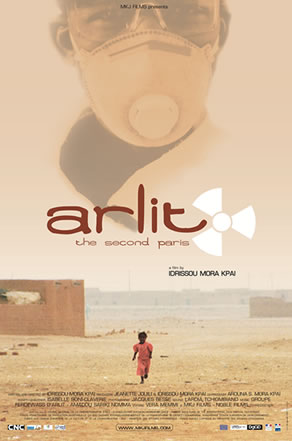FILMS
Arlit
- STORY

Arlit is a case study in environmental racism set in a uranium mining town in the Sahara desert of Niger. Here European corporations extract nuclear power and profits leaving behind disease, contamination and unemployment. Ironically the primary activities of Arlit today is waiting, waiting to die of radiation related sicknesses or to emigrate to find work in Europe itself.
Arlit was once a boom town. During the oil crunch of the early 70’s its uranium mines flourished eventually employing 25,000 workers from around the world in high paying jobs. Arlit was alive 24 hours a day, with frequent international flights, nightlife, earning it the nickname, “le deuxiéme Paris.” Then came the collapse in uranium prices and the Tuareg rebellion against the central government in Niamey more than 500 miles to the southwest. Arlit became a shadow of its former self.
When there was nothing more which the Europeans wanted they abandoned the town leaving behind the derelict machinery littering the desert which is so memorable an image in the film. Arlit demonstrates the ultimate bankruptcy of overseas investment in commodity based industry as a strategy for development.
- FESTIVALS
- Berlin International Film Festival, Forum ; Germany ; 2005
- Fribourg International Film Festival, Switzerland ; 2005
- Fespaco; Burkina-Faso ; 2005
- Afrian, Asian and Latin American Film Festival ; Milan ; Italie ; 2005
- Freiburger Film Forum ; Germany ; 2005
- Durban International Film Festival ; South Africa ; 2005
- International Film Festival Munich ; Germany ; 2005
- International Film Festival Innsbruck ; Austria ; 2005
- Namur International Festival of French Language Films; Belgium ; 2005
- Festival Résistances ; Foix ; France ; 2005
- Festival du film d’Afrique et des îles; Réunion ; 2005
- Sheffield International Documentary Festival ; England ; 2005
- Black Movie International Independent Film Festival, Geneva, Switzerland ; 2005
- Documentaire sur Grand Ecran; Paris ; France ; 2006
- Les Rencontres Cinéma de Gindou ; France ; 2006
- XVIII. Fernsehworkshop Entwicklunspolitik ; Germany ; 2006
- Amiens International Film Festival ; France ; 2006
- Amakula Kampala International Film Festival ; Uganda; 2006
- Ouidah International Film Festival ; Bénin ; 2006
- International Screenwriters Festival ; Bourges ; France ; 2006
- Tarifa African Film Festival; Spain ; 2006
- CinemAmbiente Festival ; Turin0 ; Italie ; 2006
- Etnia Film Festival ; Turku ; Finland ; 2006
- Festival Afrique Taille XL ; Brussels ; Belgium ; 2006
- Tübingen-Stuttgart International French FIlm Festival ; Germany ; 2006
- Festival Africa Alive ; Frankfurt ; Germany ; 2006
- CinemAfrica Film Festival ; Stockholm ; Sweden ; 2006
- CinemaAfrika; Zürich ; Switzerland ; 2006
- Kino Otok – Isola Cinema International Film festival ; Slovenia ; 2006
- Environmental Film Festival of Accra ; Ghana ; 2007
- Festival Vues d’Afrique ; Montréal ; Canada 2007
- Globale Filmfestival ; Berlin ; Germany ; 2007
- Prades Ciné-Rencontres Festival ; France ; 2007
- Festival Regards sur le Cinéma du Monde ; Rouen ; France ; 2008
- AWARDS
- Best Documentary ; Regard sur le Cinema du Monde ; Rouen ; France; 2008
- Best Documentary ; Tarifa African Film Festival ; Spain ; 2006
- Best Documentary ; Ouidah International Film Festival ; Benin ; 2006
- One-World Film Award, Cologne ; Germany ; 2006
- Prize of the City of Amiens; Amiens International Film Festival; France ; 2005
- Best Documentary, TV5 Award ; Namur International Festival of French Language Films ; Belgium ; 2005
- Best Documentary; African, Asian and Latin American Film Festival, Milan ; Italie ; 2005
- French Institut Award ; Innsbruck International Film Festival ; Austria; 2005
- CAST/CREW
DIRECTOR
Idrissou Mora-Kpai
SOUND
Lardia Tchombiano
PRODUCTION
MKJ FILMS – NOBLE FILMS
PRODUCERS
Jeanette Jouili
Idrissou Mora-Kpai
MUSIC: Ferdewass (Arlit)
Amadou Sariki Nomma
EDITOR
Vera MEMMI
CO-PRODUCER
Arouna Sacca Mora-Kpai
